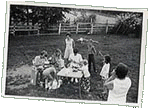|
Variety Magazine Review |
|
|
12/29/00 Seven Sisters: A Kentucky Portrait (Docu) A Patrick Donohew production. Produced, directed by Donohew. By DENNIS HARVEY "Seven Sisters," about said sibs born and raised in Depression-era Appalachia, is a deluxe family album in this straightforward, celebratory docu. Without laying it on too thick, Patrick Donohew's feature provides a look at some real "family values" -- loyalty, affection and mutual support through fair weather and foul. The Cox siblings, the oldest now 75, are a lively and diverse bunch who have each retained her signature characteristics from childhood: Eldest Scarlette, who once tried to cut a sis's throat, remains the most temperamental; Charlotte is the family stoic ("I don't lollygag over anything"); Cora is "short and sweet"; Ethel's the tomboy. They toiled from an early age on the family tobacco farm, but also excelled at school (apart from the mildly retarded Glenna), getting no lack of love and encouragement from their parents. The older Cox offspring took advantage of WWII's home-front needs to flee the nest and become working women; younger ones benefited from college scholarships. Their strong-willed, beloved if somewhat possessive dad was not always pleased with these departures, especially once the sisters started getting married (grandchildren delighted him, however). He was also dealt blows when forced to sell the farm and move to urban Lexington, then later when the quiet, devoted Mrs. Cox died after a quarantined TB illness that had left her junior daughters virtually motherless during that time. Perhaps as a result, the youngest, Carole, seemed ill-starred, succumbing to cancer on the brink of middle age following an abusive marriage and subsequent hard road as a single parent. The surviving Cox women (most now great-grandmothers) are so ingratiating -- especially when they're in sassy disagreement -- that their tearful recall of such sad developments has an emotional effect on the viewer as well. Resulting portrait is engrossing, moving at times, conveying a palpable sense of the late Mr.Cox's large-spirited resiliency. But docu could have risked a longer running time without losing our interest; it's disappointing that the Cox gals speak so little about themselves. (Curious, too, that we never really get to see them interact with one another; pacey but routine tech package pretty much sticks to individual talking-head interviews, fleshing out the past via old home movies, family photos, period newsreels, etc.) While current edit can't be faulted for economy, an extended broadcast/tape version would be welcome. Taken singly, the Coxes' stories are unremarkable. But choruslike effect of sextet's straight-talk storytelling adds an archetypal, Americana quality that's highly engaging as well as novel. It also strikes a wistful, nostalgic chord, though mercifully there's no soapboxing here about the Good Old Days of the Nuclear Family Unit. Unfussy presentation gets a boost from score of traditional and original tunes by contempo bluegrass ensemble the Crooked Jades. Debuting feature helmer Donohew is Ethel Cox's son; wisely, he doesn't add his own commentary to the already crowded "cast" roster. Camera (color, HD vid), Donohew; editor, John Douglas White; original music, the Crooked Jades; music supervisor, Jeff Kazor; sound mixer, Carl Rusk. Reviewed at Dolby Labs, San Francisco, Oct. 10, 2000. (In Film Arts Festival, San Francisco.) Running time: 86 MIN. |
| Home | Introduction | The Story | Quicktime Preview | For Educators |
Soundtrack | Reviews/Awards | Key Personnel | Sponsors | Purchase a Copy |
(415) 826·0460, SevenSisters@sourmashfilms.com , © 2000 sour mash films
